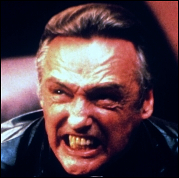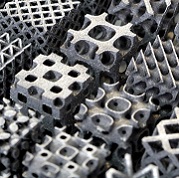|
this interview man quote:In the end, the VFX House D-Neg used an animated CGI Joi for that shot. It’s subtle, but it feels like the program conserves energy when she’s not being watched – she defaults to something more robotic. A beautiful happy accident. still reading thru it
|
|
|
|

|
| # ? May 22, 2024 13:08 |
|
From one of my favorite collections of short stories as a child; "The Farmer on the Dole" by Fredrik Pohl, with synopsis taken from wikipedia: "This story deals with a robot, Zeb, who spent the first part of his life as a soybean farmer. But his owner eventually falls on hard times and sells the farm, forcing his robots to move on. Zeb is sent to Chicago where he is given a new job as a mugger. At this point most human beings have left the planet and only a few remain on the earth. The robots are employed to keep society appearing the same as it was before humanity escaped into orbit. On two occasions Zeb violates protocol and mugs a human being. Forced to run from the law, he eventually falls in with other robot discontents and eventually finds himself at the head of a burgeoning robot liberation march." Seemed relevant. It's how I choose to fill in the blanks as life in future LA is sadly left unexplored in the film. Synthetic farming can only really be interpreted as the literal farming of (materials to build) synthetic people. The police woman fears that if replicants could reproduce that slavery might be abolished. Wallace and the rebellion seem to take the view that slavery will simply become more widespread, ie the conflict is the rebellion believe better not to be born at all than born a slave. Since Sapper himself works to create replicants, the movie isn't really coherent. Sinding Johansson fucked around with this message at 05:15 on Nov 16, 2017 |
|
|
|
brawleh posted:The undergrounds belief, where many imagine being the child(likely born from Freysa telling the story) and "more human than human" again carries with it particular implications in relation to dreams - the omitted negative less human than human has to be grappled with. Stelline as the exception that proves the rule falls apart where the dignity afforded human life you're asserting de-emphasizes the orphan slaves, the Star Wars sandpeople and the alienating Joi - the less than human. On the simple formal level of what’s shown, consider how the everyday is presented. The contrast between Joe, Sapper and Stellina life and those less human than human. Yes replicants face racism and are hunted/retired if they run, but you’re moving very quickly in drawing your conclusions. True power lies with humans, so it's humans who created the conditions for those child slaves/vagrant scavengers/AI like Joi. Some replicants are afforded positions of privilege, but intersectionally they're still victims of oppression--K is moments from being killed because he loses the composure required for his job, for instance. This is reflective of the original Do Androids Dream of Electric Sheep? where the focus is on the dehumanization of seemingly human androids, but several chapters are devoted to a human who, due to his intelligence level, is treated as less-than-human and is outcast. Ultimately replicants are people, so the point being highlighted are the ways society tries to enforce "otherness" in order to create hierarchies. I feel like it's putting the cart before the horse to imply that the replicants ought to be overturning the entire social order when the film presents their discontent at an early enough stage that they're still looking for leadership and symbols of hope. I also think it's important to note that the rebellion isn't the central aspect of the story. K isn't Luke Skywalker joining the fight against the Empire. He actively goes against the requests of the rebels by saving Deckard and seems to be looking for some form of personal fulfillment by the end of the film. The fact that they want to have Deckard killed--the Deckard who K bonds with and accepts as a sort of surrogate father--situates them in the movie not as heroes but as another faction to fall in with, and K's decision to operate on his own terms implies that the movie is more interested in the idea of emerging personal identity in an oppressive society than it is in telling an android revolution story.
|
|
|
|
Sinding Johansson posted:Synthetic farming can only really be interpreted as the literal farming of (materials to build) synthetic people. Wallace’s “synthetic farming” is presented as a specific solution to environmental collapse and famine. Presumably it’s actually food.
|
|
|
|
Edit: double post, sorry folks.
|
|
|
|
That solution specifically being the mass production of a superhuman slave labor force on a scale not before possible. This isn't spelled out but otherwise, why and how would good Ol' Farmer Wallace turn into some weird technocrat people-manufacturer and what would the significance be of Sapper being a grub farmer. Sinding Johansson fucked around with this message at 05:19 on Nov 16, 2017 |
|
|
|
Proprietary agricultural biotech is an actual thing in actual life. Monsanto are definitely corporate technocrats whose motivation is not simply to feed people out of the goodness of their hearts.
|
|
|
|
Sinding Johansson posted:Synthetic farming can only really be interpreted as the literal farming of (materials to build) synthetic people. The police woman fears that if replicants could reproduce that slavery might be abolished. Wallace and the rebellion seem to take the view that slavery will simply become more widespread, ie the conflict is the rebellion believe better not to be born at all than born a slave. Since Sapper himself works to create replicants, the movie isn't really coherent. Well, no; one of the few things they do specify is that synthetic farming is used to feed humans. What you’re saying is only accurate in the sense that Replicants eat the same food, because they are also human (albeit bioengineered). Wallace’s motivations are very poorly illustrated, so you’re mixing up two plot points. Wallace first fed the world* using some kind of technology, then used the profit to jumpstart his plan to replace humanity with something... more resilient? So they can survive in space... better? He also began selling phones at some point. It’s unclear if he was selling phones before the famine or after. (To repeat, Wallace is best understood as a Russell-Crowe-in-Man-Of-Steel reference, held over from when Blade 2 was still a Christopher Nolan project.) Bizarrely, we are shown effectively nothing about the manufacture, buying, and selling of replicants. For all the focus it gets in the discussion, replicant slavery is patently not what the film is ‘about’. (Even Wallace’s lobby is decorated with the preserved corpses of Nexus 8s - made by Tyrell Corp, and then banned and discontinued, over twenty years before the events of this film). *This raises even more questions though, about the geopolitical situation, since the goddamn Soviet Union never collapsed. Did Wallace sell his food tech to the ruskies? If so, how? Or are there parallel enterprises producing food and stuff in the USSR? Are the ballerina ads advertising Soviet replicants or Soviet... cellular phones?
|
|
|
|
Xealot posted:Wallace’s “synthetic farming” is presented as a specific solution to environmental collapse and famine. Presumably it’s actually food. This leads to one of those nice scenes that gets a lot across quickly, where K gets served his bowl of worms with a nice meat-and-potatoes dinner projected over top.
|
|
|
|
SuperMechagodzilla posted:*This raises even more questions though, about the geopolitical situation, since the goddamn Soviet Union never collapsed. Did Wallace sell his food tech to the ruskies? If so, how? Or are there parallel enterprises producing food and stuff in the USSR? Are the ballerina ads advertising Soviet replicants or Soviet... cellular phones? For whatever reason, I read this as CCCP having become a brand, like "Swiss Army".
|
|
|
|
Sir Kodiak posted:I'd love a citation to polling or other research on this. A lot of that is anecdotal. The sorts of people I see saying that, are the sorts of people with a very high likelihood to say that the media isn't representing them to begin with. Being told you're a disaffected millennial while you're buried in student debt struggling to pay the bills, etc. The closest I can find offhand is from Pew: http://www.people-press.org/2017/10/24/5-views-of-the-economy-and-the-social-safety-net/ 43% said the government "can't afford to do much more to help the needy" and 41% said our economy is a zero-sum game where anything we want comes at the expense of something else. I'd expect a lot of crossover between those groups. That's not a majority, but in a world of deeply divided entrenched positions it makes perfect sense to say there's a significant group in the middle who would love to do more if they thought we could afford to pay for it. Across the board. I think 2049 is a great canvas you can paint to sorts of feelings on to. Imagine someone in the world of 2049 trying to pass a bill to offer universal healthcare to all the citizens, even the miscreants in the alleys. Sure that would be great, I'd love coverage next time the midget street gang shows up at my door. But I can't even afford to own a real snake. Good luck trying to get the money out of the giant megacorps either, because they have all the real power, and I work for a megacorp so if you do get the money from them it'll end up coming out of my pocket anyway. I'm saving up for my ticket to the offworld colonies, that might be the best I can hope for.
|
|
|
|
HUNDU THE BEAST GOD posted:For whatever reason, I read this as CCCP having become a brand, like "Swiss Army". I think it’s supposed to be more that authoritarian capitalism has won the day, and so the US and the USSR are natural allies. This is another thing that betrays the ideology of the film: things are as bad as they are in the Blade Runner 2 universe (all life on Earth goes extinct right around now) because history hasn’t ended yet. Liberal democracy has not yet had its triumph. The leap in time between the two films is from 1982 to 2017 - i.e. directly from Brezhnev to Putin - skipping the 1990s altogether. It turns out that Zizek himself wrote a very good review of the film, that points out a lot of the shortcomings and failures: http://thephilosophicalsalon.com/blade-runner-2049-a-view-of-post-human-capitalism/ It’s particularly interesting since so much of the film is seemingly based on Zizek’s writing (his essay “No Sex Please, We’re Post-Human” covers basically every topic raised in the film).
|
|
|
|
A possible explanation for the long held cuts other than moodquote:The Wallace building, for example, had this slowly moving artificial sunlight. It just felt such a groovy idea, artificial sunlight following the characters around the most sophisticated office on earth, owned by a blind man. That means that a shot like Luv walking down a corridor, which in a normal drama you’d probably hold for three or four seconds, but here with slowly shifting caustics you’d be decimating a world-class cinematic moment if you didn’t give that the necessary slot. I guess the choices are about picking which moments to sell and which to buy. And that made it a really interesting edit. Because it looked cool as poo poo, that's why
|
|
|
|
revwinnebago posted:A lot of that is anecdotal. The sorts of people I see saying that, are the sorts of people with a very high likelihood to say that the media isn't representing them to begin with. Being told you're a disaffected millennial while you're buried in student debt struggling to pay the bills, etc. "I would love to do universal healthcare, but the debt!" is a strategy for politicians to avoid admitting they fundamentally aren't interested in helping poor people. Your link actually argues against it being believed by a meaningful portion of the population. According to the article, the "the government cannot afford to do much more to help the needy" percentages pretty much match the "it is not the government’s responsibility to make sure all Americans have health care coverage" percentages. Which suggests, that, no, actually they wouldn't love to do more, whether or not they thought we could afford to pay for it. We should expect to see a big gap between those numbers if the national debt were the actual issue. edit: I'm happy to accept that "a lot of people" is true if you mean a tiny percentage of the population, which, in a big country, can still technically be a lot of people. I just want to be clear that I've seen no evidence it's a meaningful factor in actual policy or a dominant voting block. Sir Kodiak fucked around with this message at 20:40 on Nov 16, 2017 |
|
|
|
Cephas posted:True power lies with humans, so it's humans who created the conditions for those child slaves/vagrant scavengers/AI like Joi. Some replicants are afforded positions of privilege, but intersectionally they're still victims of oppression--K is moments from being killed because he loses the composure required for his job, for instance. Where power emerges and how it concentrates within a system in delegating who owns what, holds power over whom and so-on is key. That “true power lies with humans” in creating these conditions is far too general, because intersectionally replicants, humans and Joi are all victims of oppression in this system. If anything to is be delineated here, it’s this as a starting point. Because going further with this "true power" line of thought, it’s seemingly preoccupied with identity politics or whatever - so where’s this leading, that the answer is replicant CEOs? Well the movie is seemingly interested in arriving at this conclusion. What's being put forward is that the movie is a liberal-capitalist utopian fantasy; that the underground are reactionaries, not revolutionaries; that Wallace cannot simply be read as greedy, or the horrific state of things as anti-capitalist; and that Joe's personal journey is informed by his belief that the memory is real. What's contentious or being grappled with is this idea of a light or hope in the darkness in relation to kindness and strangers - where Joe saves Deckard; with its negation where Joi dies and the woman who knew of his inner most desires and dreams becomes a stranger - following her radical act and his traumatic loss the giant-neon demon Joi emerges. Joe's personal journey from killing Sapper and cutting out his eye, to saving of his surrogate father Deckard are informed by the same dream and straightforwardly both acts were all too human. So this journey of self actualisation is strangely inert, where the (internal)conflict is simply reduced to a sentimental humanitarian one rather than approaching anything political - it’s been said before but it’s worth repeating, this is a step backwards from Ridley Scott’s film. brawleh fucked around with this message at 18:39 on Nov 16, 2017 |
|
|
|
brawleh posted:Your idea of a light in the darkness in relation to acts of kindness between strangers misses the violent traumatic point where Joi becomes a stranger to Joe, with shark like eyes - an impenetrable abyss. Then, after reflecting on the loss of the love that he felt with Joi, Joe finds it within himself to show kindness to another stranger, Deckard. And Deckard, in bewildered gratitude, asks Joe why he would have done that - "what am I to you"? Joe, against all odds in this lovely world, has learned to love, and he's willing to act out of kindness to strangers when no one else is. That's quite the change from his encounter with Sapper (and we're reminded within the scene of that encounter via Sapper's voiceover). It also echoes Roy's final encounter with Deckard in an interesting way (and we're reminded of that by the snowfall in Joe's final moments). This movie's message is basically Christian, and has very little to do with revolutions or liberal utopias. Ersatz fucked around with this message at 19:23 on Nov 16, 2017 |
|
|
|
SuperMechagodzilla posted:*The dead tree is in Bautista’s yard is worth several million dollars, according to the logic of the film, but nobody cares.
|
|
|
|
The radical Christian gesture within the movie lies with Joi and specifically in two parts. The first where she forsakes eternity(even if she’s unaware of her own mortality) for love of an imperfect individual - Joi’s radical act is that of the Wagnerian hero. And secondly when she becomes the Christian neighbour in the form of the giant neon demon after trauma. Joe retreats from this to the safety of his memory, whatever Deckard is to Joe it’s not simply a stranger due to how the memory informs the relationship. The idea of Christ's love as not revolutionary is very strange. "Do not suppose that I have come to bring peace to the earth. I did not come to bring peace, but a sword. For I have come to turn "'a man against his father, a daughter against her mother, a daughter-in-law against her mother-in-law. A man's enemies will be the members of his own household.” - Matthew 10:34-36
|
|
|
|
brawleh posted:The idea of Christ's love as not revolutionary is very strange. Joe detects bullshit, turns his back on them, and does the opposite. Ersatz fucked around with this message at 20:21 on Nov 16, 2017 |
|
|
|
Yeah absolutely, the underground are reactionaries.
|
|
|
|
I can't remember, does the scene with the giant JOI projection comes after Deckard rejects new-Rachel because her eyes are supposedly the wrong colour? Nice callback I think.
|
|
|
|
starkebn posted:I can't remember, does the scene with the giant JOI projection comes after Deckard rejects new-Rachel because her eyes are supposedly the wrong colour? Nice callback I think. Think so. And looking at this page, I am once again reminded how boring anti-capitalist film critique can be.
|
|
|
|
Shageletic posted:And looking at this page, I am once again reminded how boring anti-capitalist film critique can be. A burn on BR2049.
|
|
|
|
starkebn posted:I can't remember, does the scene with the giant JOI projection comes after Deckard rejects new-Rachel because her eyes are supposedly the wrong colour? Nice callback I think. Yes. To make it even more obvious, when Wallace wheels out not-Rachael, he says "More joy, then."
|
|
|
|
Shageletic posted:And looking at this page, I am once again reminded how boring anti-capitalist film critique can be. Your take is that love is good and there’s water imagery. The movie’s cool and blind people are subhuman, or something. (Water = birth?)
|
|
|
|
The movie deserves mucho cred just for having very long shots while costing $150m.
|
|
|
|
I think the grubs are grown because, like the bees, insects are some of the only non-constructed animals left on Earth. Any animal can be constructed as a replicant, but replicants can't reproduce, so people are left to farm insects as a food source. Why this is necessary to save humanity is unclear, as we're shown that Sapper is growing plants from food, and humanity could easily subsist on plant-based foods. Seems like that would be better than eating grubs. Maybe Wallace was able to make grub farming more efficient than plant-based agriculture. Still, if we assume that the people eat the grubs and want meat, it would make sense for Wallace to be obsessed with unlocking replicant reproduction not just to make his angels, but also for agricultural purposes, and terraforming in the offworld colonies.
|
|
|
|
Farming insects would be way more efficient than vegetable farming and even more efficient than growing cows for beef. Insects have a lot of nutritional value. Nobody wants to do it IRL though because everyone thinks that eating bugs is gross. In BR2049 the Earth is so turbofucked that they have no choice but to stick with bugs and some vegetables.
|
|
|
|
|
Just saw this the other day and felt completely dominated by the score. The best and most faithful sequel I have ever seen.
|
|
|
|
Ersatz posted:You're presumably right about the dollar value, but nobody cares because it's the tree of knowledge in the fallen garden. Its fruit (Rachel's body) is far more valuable. I thought they said in the film that the tree wasn't real.
|
|
|
|
SuperMechagodzilla posted:This is another thing that betrays the ideology of the film: things are as bad as they are in the Blade Runner 2 universe (all life on Earth goes extinct right around now) because history hasn’t ended yet. Liberal democracy has not yet had its triumph. The leap in time between the two films is from 1982 to 2017 - i.e. directly from Brezhnev to Putin - skipping the 1990s altogether. The unspoken, assumed statement of the films is that liberal democracy will not have its triumph, though. The first film jumps ahead thirty years to show a world that has been nearly destroyed by liberal democracy. The second film jumps ahead another thirty to show a world that has been successfully destroyed by liberal democracy, with humanity as it exists essentially trying to clean up the scraps. If liberal democracy hasn't had its triumph by 2049, can a viewer reasonably assume it ever will, or is the ideology of liberal democracy simply a load of bullshit?
|
|
|
|
LORD OF BOOTY posted:The unspoken, assumed statement of the films is that liberal democracy will not have its triumph, though. The first film jumps ahead thirty years to show a world that has been nearly destroyed by liberal democracy. The second film jumps ahead another thirty to show a world that has been successfully destroyed by liberal democracy, with humanity as it exists essentially trying to clean up the scraps. If liberal democracy hasn't had its triumph by 2049, can a viewer reasonably assume it ever will, or is the ideology of liberal democracy simply a load of bullshit? I don’t recall any criticism of liberal democracy in this film.
|
|
|
|
SuperMechagodzilla posted:I don’t recall any criticism of liberal democracy in this film. Your posts are a lot better when they're short and sweet like this. The most senior government official we see is a goddamn police lieutenant. How is there any kind of conversation going on about liberal democracy?
|
|
|
|
SuperMechagodzilla posted:I don’t recall any criticism of liberal democracy in this film. I'm saying that the state of the setting is, in and of itself, a criticism, if we are supposed to take the setting as a liberal democracy. The world of the Blade Runner movies is not a particularly nice place to live by any means, and 2049 in particular is an outright apocalyptic vision; here, the visuals speak so that the plot can worry about other things.
|
|
|
|
LORD OF BOOTY posted:I'm saying that the state of the setting is, in and of itself, a criticism, if we are supposed to take the setting as a liberal democracy. But what led you to that conclusion? Blade 2 is, ideologically, a liberal film.
|
|
|
|
I'm curious which recent Hollywood movies in wide release haven't been ideologically liberal.
|
|
|
|
SMERSH Mouth posted:I'm curious which recent Hollywood movies in wide release haven't been ideologically liberal. God's not dead.
|
|
|
|
LingcodKilla posted:God's not dead. Not a Hollywood movie iirc but either way American conservatism is definitely liberal in the sense they mean
|
|
|
|
SMERSH Mouth posted:I'm curious which recent Hollywood movies in wide release haven't been ideologically liberal. Boss Baby.
|
|
|
|

|
| # ? May 22, 2024 13:08 |
|
Jared Leto was overdone IMO. Like, if you asked him the time he'd respond "Time... is the link between our souls... and our needs... and you just might see it... for a moment... at the edge of existence..." And 70 year old Deckard punching K like he was punching a pillow. I mean, punching someone square in the jaw does bad things to your hand even if you're young, let alone a grandpa who's been surviving mostly on whiskey in a dusty castle for decades... I liked pretty much everything else. Thank you, you can proceed with the Marxist theory now.
|
|
|


































